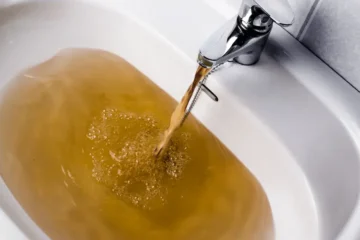Well water, sourced from beneath the Earth’s surface, is a vital resource for many households. Its quality is a subject of considerable interest, with the depth of the well being a common factor in discussions about water purity.
In this article, we explore the intriguing question: Does well water get better the deeper you go?
Factors in Well Water Quality
The quality of well water can be affected by a variety of factors, both natural and human caused. Here are some of the most important ones:
- Natural Factors
- Human Caused Factors
1. Natural Factors
- Geology: The type of rock and soil that the well is drilled into can influence the water’s mineral content, pH, and hardness. For example, wells drilled in limestone areas are more likely to have hard water, while wells drilled in granite areas are more likely to have acidic water
- Depth: The deeper the well, the less likely it is to be contaminated by surface pollutants. However, deeper wells can also be more expensive to drill and maintain.
- Recharge: The rate at which groundwater is replenished can affect the water quality. Wells in areas with low recharge rates are more likely to be contaminated by pollutants.
2. Human Caused Factors
- Land use: Agricultural activities, such as the use of fertilizers and pesticides, can contaminate groundwater. Septic systems can also be a source of contamination if they are not properly maintained.
- Industrial activities: Factories, mines, and other industrial facilities can release pollutants into the air and water, which can then contaminate groundwater.
- Waste disposal: Improper disposal of hazardous waste can also contaminate groundwater.
Is Well Water Better The Deeper You Go?
The quality of well water is influenced by a combination of factors, and depth alone does not singularly determine its overall quality. Various elements, including geological conditions, local environmental factors, and human activities, play crucial roles in shaping the characteristics of well water.
So, does depth matter? It can play a role, like a sturdy lock on your treasure chest. Deeper wells generally tap into older, more filtered water sources, away from surface contaminants. But it’s not a guarantee!
While it is a general observation that, in many cases, deeper wells tend to yield better water quality, this is not a universal rule. Understanding the complex interplay of these factors is essential for assessing and improving well water quality.
Deep Well Water: Pros and Cons
Benefits of Well Water Going Deeper
- Reduced Contamination Risk: Deeper wells are less likely to be affected by surface contaminants like fertilizers, pesticides, or animal waste. This is because the water has passed through more layers of soil and rock, which act as natural filters.
- More consistent water supply: Deeper wells tap into aquifers that are less susceptible to fluctuations in seasonal rainfall or drought. This can be important if you live in an area with dry periods.
- Potentially higher water quality: Deeper aquifers can sometimes contain water with fewer dissolved minerals and less hardness, which some people prefer.
Challenges of Well Water Going Deeper
- Increased cost: Drilling and maintaining deeper wells is more expensive than shallow wells.
- Potential mineral content: Deeper water can contain higher levels of naturally occurring minerals like calcium and magnesium, which can make the water hard and leave residue in appliances.
- Increased arsenic risk: In some areas, deeper aquifers may have higher levels of arsenic, a naturally occurring element that can be harmful to health.
- Older, stagnant water: Deep water has been underground longer, which can increase the risk of bacterial contamination if the well isn’t properly sealed and maintained.
- Higher mineral content: Deeper aquifers can have higher concentrations of naturally occurring minerals like calcium and magnesium, which can make the water hard and difficult to use for certain purposes.
- Increased presence of certain contaminants: In some areas, deeper aquifers may contain naturally occurring contaminants like arsenic or fluoride that can be harmful to health.
- Higher cost of drilling and maintenance: Deeper wells require more drilling and equipment, making them more expensive to install and maintain than shallower wells.
Minimum Depth of A Well in Feet
In many regions, a well depth of 80 to 100 feet may be sufficient to reach a reliable water source.
However, it’s important to note that the actual minimum depth can vary based on factors such as local geological conditions, water table levels, and intended use of the well.
Average Depth of A Well in Feet
The average depth of a well typically falls within the range of 100 to 300 feet. This range is common for domestic water wells and is influenced by factors such as geological conditions, water table depth, and local hydrogeology.
Wells within this depth range are often drilled to access aquifers that can provide a reliable and sustainable water supply for residential and agricultural purposes.
Maximum depth of Well in Feet
The maximum depth of a well can extend beyond 800 feet, depending on various factors such as geological conditions, water table depth, and the specific hydrogeological characteristics of the region.
In some areas, especially where deep aquifers are present, wells may be drilled to depths exceeding 800 feet to tap into a sustainable and reliable water source.
FAQs
Do deeper wells mean better water?
Deeper wells don’t necessarily guarantee better water quality; it depends on geological conditions. Water testing is crucial to ensure safety regardless of well depth.
Is 60 feet deep enough for a well?
A 60-foot well may be sufficient, depending on the local water table and geological factors. Site-specific assessments and water testing can determine suitability.






[…] Consequently, opting for a deeper well typically guarantees a more consistent and reliable water source. […]
[…] tracks with the Whole House Water Acid pH Neutralizing System, the ultimate acid neutralizer for well water. This powerful system uses Calcite, a naturally occurring calcium carbonate mineral, to gently […]